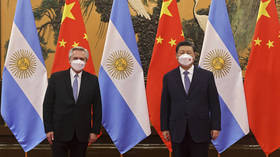Britain is undermining the EU to upset China and please the US

Yesterday, the United Kingdom announced that it was adding itself as a party to a World Trade Organisation (WTO) dispute between the European Union and China, as part of a growing row between Beijing and Lithuania over the launch of a Taiwan representative office in the Baltic country.
China has effectively placed a de-facto trade embargo and secondary sanctions regime on Vilnius, and while EU heads of state have been reluctant to be too vocal in confronting Beijing, Britain’s controversial Foreign Secretary Liz Truss has now positioned herself at the heart of the matter.
She accused China of “economic coercion” – a buzz phrase which has gained currency among the media and political classes to describe Beijing’s retaliation towards countries hostile to it, such as Australia.
🇬🇧 and our partners 🇪🇺 🇺🇸 🇦🇺 🇱🇹 will continue to lead the way in calling out China’s economic coercion. Together we will stand up to these attempts to undermine freedom and democracy. https://t.co/kdloAYISEz
— Liz Truss (@trussliz) February 7, 2022
Some might consider the move something of a surprise, given that Britain has now left the EU. But it speaks volumes about the direction of Britain’s foreign policy since Brexit – and since Truss was appointed foreign secretary – which has increasingly embraced the idea of great power nostalgia and Anglophone exceptionalism. The shouting match over Lithuania in particular suggests Britain is effectively becoming a proxy for American foreign policy goals within Europe, and is being used as a tool to disrupt the bloc’s relationship with China.
Since the end of World War II, the story of Britain’s foreign policy is one of contradiction, to put it mildly. It is the tale of a declining empire, which has repeatedly failed to be realistic about its place in the world, and this has manifested itself in its constant tilting between the US and Europe.
The so-called “special relationship” with America embodies the nostalgia of empire, the belief in the supremacy of Anglophone capitalism, clashing with the more mundane reality of Britain being in Europe. This has created longstanding disorientation, ranging from Charles de Gaulle’s rejection of Britain’s entry to the bloc on the basis of its relationship with the US, to Euroscepticism and Brexit itself.
Now empirical nostalgia has won. Upon leaving the EU, the UK has reinvented itself as Global Britain. As Brexit talks came to an end in 2020, the UK reoriented its foreign policy to align even more closely to the US’, embracing the anti-China rhetoric espoused in Washington, considering itself a Pacific power and sending aircraft carriers into the South China Sea.
With this has come the idea of the EU being less of a partner, and more of an economic and strategic competitor. The UK has engaged in multiple rows with France over fishing rights and actively undermined Paris further with the controversial Aukus deal, all while edging closer to other Anglophone states such as the US and Canada.
With that, Britain appears to have positioned itself as a pro-US, anti-China proxy in Europe: a player that can undermine the EU’s relationship with Beijing, to the benefit of American interests. One good example is how the UK, via the BBC, actively helped to undermine the EU’s comprehensive agreement of investment (CAI) with China in early 2021.
As my research has demonstrated, the BBC operates according to the interests of the British foreign office. In the period from the end of 2020 onwards, when talks were being concluded between Brussels and Beijing, the BBC began publishing articles on the Xinjiang region in China at a very aggressive pace. This included pieces such as “China’s tainted cotton” in December 2020, and the pushing of accusations of rape and sexual abuse in internment camps in February 2021.
This escalation in BBC Xinjiang content coincided with a United Nations address by then Foreign Secretary Dominic Raab on the matter, which subsequently built up to coordinated sanctions by the US, UK and the EU, causing China to retaliate and prompting MEPs to freeze the CAI. Britain had been involved, ever so subtly, in setting an agenda on human rights designed to disrupt engagement with China.
Now, Liz Truss is positioning the UK to become a leading and vocal figure on the Lithuania dispute. While this has a dual purpose – serving the anti-Russia and anti-China agenda – it again points to Britain engaging in a strategy on both fronts that solidifies American interests on the continent.
The UK is willing to engage with Europe, but to all intents and purposes it sees the EU as a political and economic rival which is working against Britain’s national interest. Its support for Lithuania is intended to block France and Germany’s ability to engage with both Moscow and Beijing.
However, Truss’s claims of “economic coercion” from China are fanciful. While it is true that Britain’s own sanctions regime has grown in sophistication and scope, and can unquestionably cause economic damage to a country, the terminology applied paints China in a uniquely negative light, simply for doing what the US has always done on a much greater scale. Never are US-led sanctions referred to, in any media dynamic, as “coercion”– yet Britain under Truss has embraced this controversial term, and is hurling it around recklessly.
Has Beijing brought Lithuania to the brink of starvation, as US sanctions have done to Afghanistan, Syria, Yemen and many more countries? The answer, of course, is no. However, for Britain to back Lithuania’s government in its highly provocative foreign policy serves a number of ideological and strategic goals. Brexit has shifted the geopolitical dynamic of the continent radically, and the UK is now in effect America’s “regional policeman,” similar to Israel in the Middle East, Japan in Asia and Colombia in South America.
The statements, views and opinions expressed in this column are solely those of the author and do not necessarily represent those of RT.














